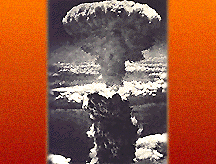 Photo Caption and Credits
Photo Caption and Credits
What does the end of the Cold War mean for the future of arms control? With the end of the superpower rivalry, major treaties on strategic nuclear reductions, conventional forces in Europe, and chemical arms have been signed and a comprehensive test ban treaty may finally be achieved. Yet, the Cold War has left a legacy of problems that arms controllers have barely begun to deal with, such as competition for control of the former Soviet arsenal, "loose nukes" and "technical mercenaries" and unsafe nuclear practices. Security threats elsewhere also loom larger now, as regional tensions combine with hi-tech conventional weapons and possible nuclear, chemical, biological, and ballistic missile capabilities. This course will cover enduring concepts, Cold War successes and failures, and contemporary arms control challenges. It will include a major arms control simulation paralleling the Non-Proliferation Treaty extension conference in April, 1995.
COURSE FORMAT: Discussion Lecture
Level: UG Credit: 1.00
Prerequisites: GOVT155
Last Updated on MAR-03-1998
Source is being researched.
Copyright Wesleyan University, Middletown, Connecticut, 06459